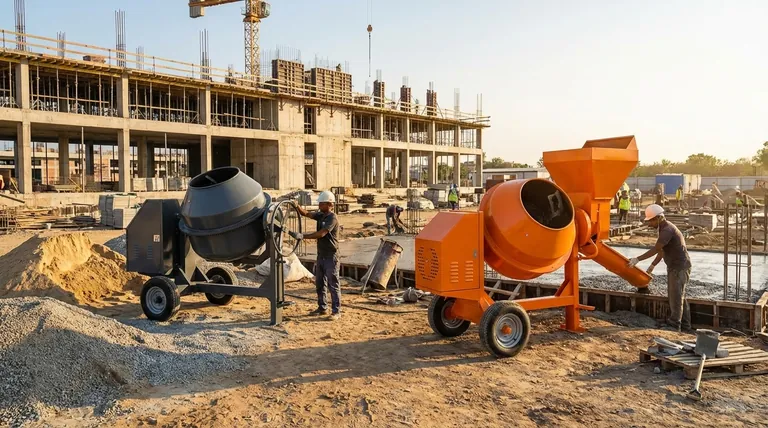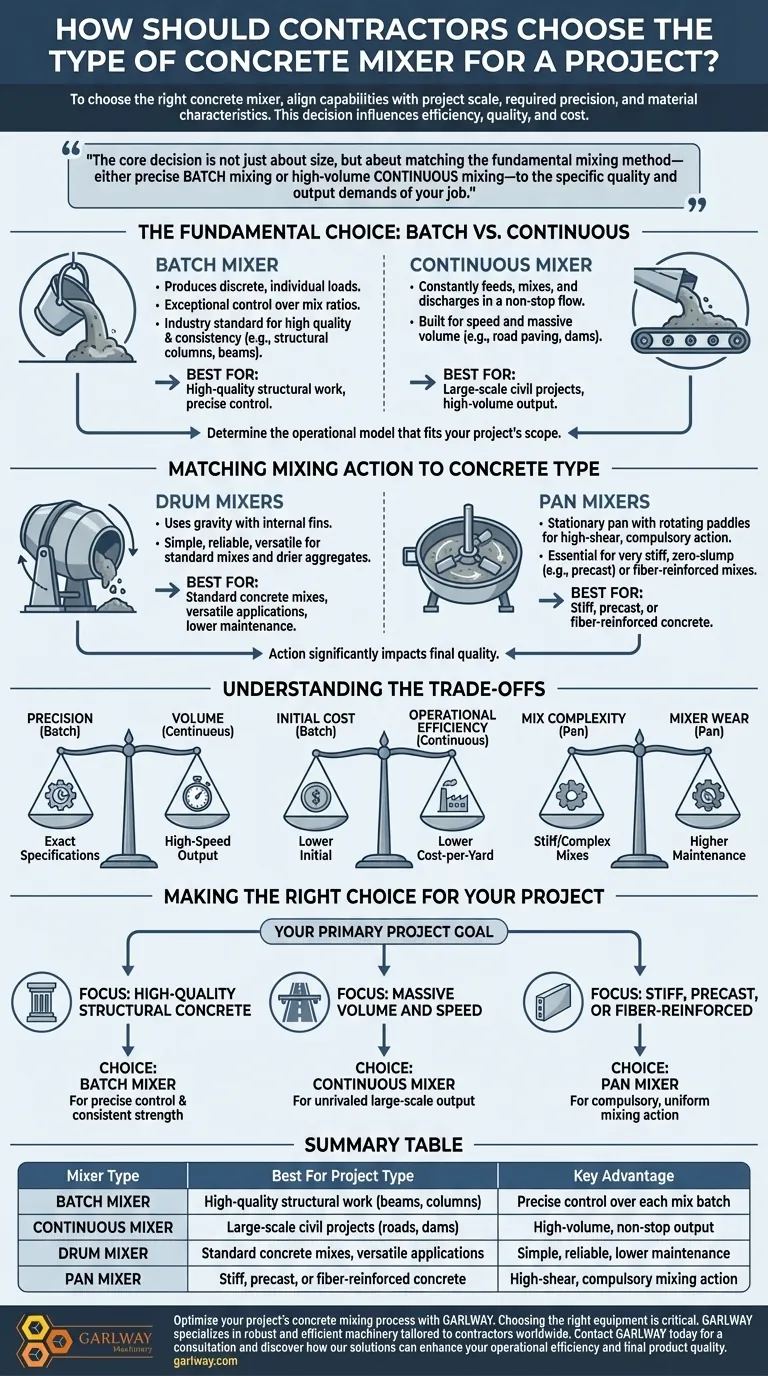To choose the right concrete mixer, a contractor must primarily align the mixer's capabilities with the project's scale, the required precision of the concrete mix, and the material's specific characteristics. This decision directly influences project efficiency, final quality, and overall cost.
The core decision is not just about size, but about matching the fundamental mixing method—either precise, individual batch mixing or high-volume continuous mixing—to the specific quality and output demands of your job.

The Fundamental Choice: Batch vs. Continuous
Your first and most critical decision is determining the operational model that fits your project's scope. This choice sets the stage for volume, speed, and quality control.
When to Use a Batch Mixer
Batch mixers produce concrete in discrete, individual loads. This method allows for exceptional control over the mix ratios for each batch produced.
They are the industry standard for projects where concrete quality and consistency are paramount, such as structural columns, beams, or specialized architectural elements.
When to Use a Continuous Mixer
Continuous mixers, as the name implies, constantly feed materials, mix them, and discharge concrete in a non-stop flow.
This approach is built for speed and massive volume. It is the ideal choice for large-scale civil projects like road paving, dams, or large foundation pours where sheer output is the primary driver of success.
Matching Mixing Action to Concrete Type
After deciding between batch and continuous operation, you must consider how the mixer physically combines the materials. The mixing action has a significant impact on the final quality of different concrete types.
Drum Mixers
Drum mixers, including reversing and tilting types, use fins inside a rotating drum to lift and drop the material, relying on gravity to achieve the mix.
This design is simple, reliable, and well-suited for standard concrete mixes and drier aggregate combinations. They are versatile workhorses for a wide range of common applications.
Pan Mixers
Pan mixers operate with a stationary pan while paddles or stars rotate inside, forcing the materials to combine through a high-shear, compulsory action.
This forceful mixing is essential for very stiff, zero-slump mixes like those used in precast concrete manufacturing or for mixes containing fibers, where thorough dispersion is critical.
Understanding the Trade-offs
Selecting a mixer involves balancing competing priorities. Understanding these trade-offs is key to making a sound financial and operational decision.
Precision vs. Volume
This is the central trade-off. Batch mixers offer unparalleled precision, ensuring every load meets exact specifications, but at a lower production rate. Continuous mixers sacrifice this granular control for massive, high-speed output.
Initial Cost vs. Operational Efficiency
A high-capacity continuous mixer represents a significant capital investment but can deliver a lower cost-per-yard on enormous projects. A versatile batch mixer may have a lower initial cost and be more profitable across a wider variety of smaller to medium-sized jobs.
Mix Complexity and Mixer Wear
The high-shear action of a pan mixer is necessary for complex or stiff mixes but also leads to higher wear on mixing components. Simpler drum mixers generally require less maintenance but may fail to properly homogenize demanding concrete designs.
Making the Right Choice for Your Project
Use your primary project goal as the final filter for your decision.
- If your primary focus is high-quality structural concrete: A batch mixer is the correct choice to guarantee precise control over ratios and consistent strength.
- If your primary focus is massive volume and speed: A continuous mixer provides the unrivaled output necessary for large-scale paving or foundation work.
- If your primary focus is producing stiff, precast, or fiber-reinforced concrete: A pan mixer's compulsory mixing action is non-negotiable for achieving a uniform, high-quality product.
Choosing the right mixer is a strategic decision that directly underpins your project's quality, budget, and timeline.
Summary Table:
| Mixer Type | Best For Project Type | Key Advantage |
|---|---|---|
| Batch Mixer | High-quality structural work (beams, columns) | Precise control over each mix batch |
| Continuous Mixer | Large-scale civil projects (roads, dams) | High-volume, non-stop output |
| Drum Mixer | Standard concrete mixes, versatile applications | Simple, reliable, lower maintenance |
| Pan Mixer | Stiff, precast, or fiber-reinforced concrete | High-shear, compulsory mixing action |
Optimize your project's concrete mixing process with GARLWAY.
Choosing the right equipment is critical to your project's success, budget, and timeline. GARLWAY specializes in providing robust and efficient construction machinery, including a full range of concrete mixers and batching plants, tailored to the needs of construction companies and contractors worldwide.
Let our experts help you select the perfect mixer for your specific job requirements. Contact GARLWAY today for a consultation and discover how our solutions can enhance your operational efficiency and final product quality.
Visual Guide

Related Products
- Portable Electric Concrete Mixer Machine for Cement Mixing
- HZS90 Large Multiquip Concrete Mixers for Construction
- JDC350 Small Cement Concrete Mortar Mixer
- Portable Concrete Mixer Machine Equipment for Mixing Concrete
- Portable Ready Mix Concrete Mixer Equipment
People Also Ask
- Who can benefit from using portable concrete mixers? Boost Efficiency for Small-Scale and DIY Projects
- What is the use of a portable concrete mixer? Maximize On-Site Control & Efficiency
- How much concrete can you mix in a portable mixer? Maximize Efficiency on Small Jobs
- What are the four main components of a portable concrete mixer? Build Better Concrete with the Right Mixer
- How much does a portable concrete mixer hold? A Guide to Choosing the Right Capacity



















